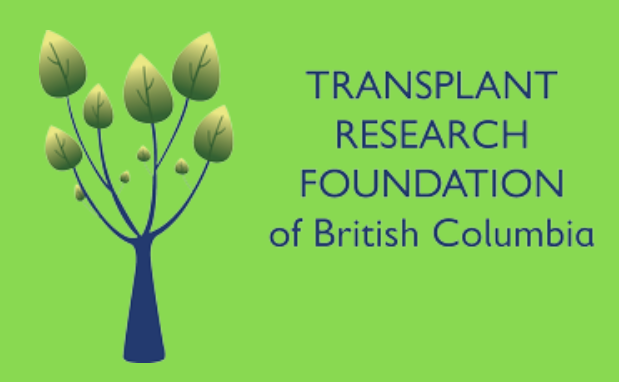Guest Speaker: Kristi Coldwell

Originally founded as the BC Transplant Research Foundation, the TRF was established in 1992 with support provided by the BC Transplant Society (BCT). They are the only charitable foundation in Canada dedicated solely to funding peer-reviewed transplantation research; supporting innovation to benefit the lives of organ recipients.
Each year the TRF provides funding to BC scientists through the Venture Grant Program and a National Research Partnerships. They are helping researchers who are exploring new areas of science and medicine that will ultimately improve the lives of pre and post transplant patients.
This help benefits British Columbians whose lives are threatened by organ failure.
Their long range vision is fornewly developed treatment strategies, technologies and therapies to be developed to eliminate the need for organ transplantation.
Kristi Coldwell told us an emotional story of her personal journey as a transplant recipient and why she is so passionate about transplant research.
Her journey began when she was born with a congenital heart defect. Unfortunately, she went undiagnosed till age 7 because the small town she lived in had no capability to diagnose her condition. At age 9 she had her first open heart surgery, followed by the insertion of a pacemaker. By age 15, she experienced significant heart failure. At this time in the late 80’s, her medical team introduced the idea of a possible transplant, a very last stage resort for patients. As there were lots of unknowns and the success rate was moderate, they decided on another heart surgery. Unfortunately, the surgery was not successful and Kristi came close to dying from massive bleeding. Eight months later she went through yet another heart surgery. By age 17, her doctor said there was nothing left and a transplant was the only option if she was to live. She and her parents were advised to think about it, as a transplant is not a cure, it is another set of disease. Although Kristi’s mother opted for palliative care to minimize further suffering and to allow Kristi to enjoy the little time left to her, Kristi decided to fight for any possibility and proceeded with the transplant option.
Kristi and her mother moved to Toronto, as there was no pediatric heart transplant programme in BC in 2000. As they waited at Sick Kids Hospital she could feel herself dying bit by bit every day. She was wheel chair bound, on oxygen full time, and in bed most of the time. She was advised that there was strong likelihood she would suffer fatal arrythmia and that when this happened her heart was too weak for them to bring her back. She went to sleep every night knowing that she might not wake up.
Kristi considers herself one of the lucky ones. After three and a half months of waiting, they got a call that there was a heart for her. Although she immediately thought of the donor and the donor’s family – who, at the worst moment of their lives thought of helping somebody else - she knew she needed to focus all energy on what was to come; surviving the post transplant phase.
Only three days after surgery, she had a cardiac arrest. Kristi’s medical team did not know if she sustained any brain damage and to what extent her new heart might have been damaged. At the time, there was limited knowledge and tools to determine the amount of cellular damage to organs during the donation and retrieval process. She could only play a wait and see game with her future at stake.
Over several years, Kristi experienced acute rejections. Her system attacked the new heart, seeing it as a foreign body. She also suffered numerous bouts of infection. This led to many painful, invasive procedures with copious amounts of medication (which she talks about later).
On the plus side, for the first time in her life Kristi experienced the amazing feeling of a normal heart beat. All her life, she had suffered arrythmia. When she told her transplant team that something was wrong, that she could not feel her heart, it was strange to be told that it was normal not to feel the heart.
Kristi feels incredibly lucky to have lived a “normal” life over the last two decades. And is always grateful for things she thought she would never experience:
- To be able to go to sleep every night in her own bed instead of hospital beds.
- To go to bed without fear of not waking up in the morning.
- To be able to graduate from high school and to go onto university.
- To get married.
As mentioned earlier, a transplant is not a cure. It is a disease in and of itself. Many people are unable to sustain the rigours of post transplant life. Every day, Kristi takes numerous anti-rejection medications - currently only sixteen, down from forty-two. These medications are potent and are very hard on the kidneys and liver, causing many transplant patients to later require kidney and/or liver transplants. They are also carcinogenic, which results in very high incidence of cancer in the transplant population. There is also ongoing fear of graft loss. Such organ failure is a very real possibility. The number one reason heart recipients require another heart transplant is chronic rejection. Kristi was told by her medical team that she will require another transplant one day. Transplant research has come a long way, but there is still long way to go. Because of transplant research Kristi is still alive.
Transplant is becoming the treatment of choice for a variety of end stage diseases such as:
- Diabetes
- Cystic fibrosis
- Cancer
- Congenital heart disease
But research is needed to make transplants a full cure for these end stages diseases, and not just the trade off it is now.
For additional information about transplant research visit http://www.trfbc.org.